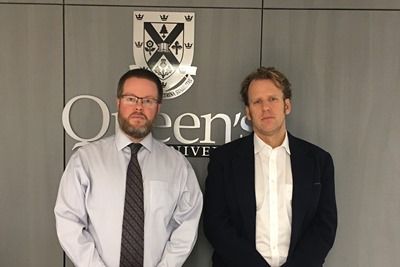
With a new director taking over on January 2, Queen’s Prison Law Clinic (PLC) is gearing up to deepen its commitment to serving the needs of those incarcerated in the Kingston area’s six federal penitentiaries and enhance students’ real-life opportunities to provide legal assistance and representation to them. Sean Ellacott, Law’01, has been part-time review counsel with the PLC since September, supervising four students while finishing off cases at his private practice, Ellacott Law Office, in Kingston.
As leader of the clinic, he’ll get it started on furthering the clinic’s litigation mandate. The clinic’s responsibilities already demand a lot of the student caseworkers it selects each year: 18 for the academic year and four for the summer. Supervised by the clinic’s lawyer-advisors, students learn to manage the solicitor/client relationship, interview inmates (always called clients), conduct case-specific research, draft legal submissions, represent clients at hearings, and prepare examinations and cross-examinations of witnesses. In the course of this work, they have opportunities to draft grievances, provide legal opinions, represent clients at Disciplinary Court or Parole Board hearings, and conduct on-site meetings with inmate groups. Ellacott hopes to add the opportunity for them to be a part of more complex litigation as well.
“That means adding a layer to what was already a remarkable opportunity for law students,” Ellacott says. “You get your own client files before tribunals. Just in itself, that’s a great thing for students to be able to do, and they get feedback on running a file.”
For him, to have PLC lawyers running litigation will mean the clinic can have a greater impact on the development of Canadian law. It also means students will be akin to articling students on those files, supporting the staff lawyers with the litigation.
“Most legal clinics at law schools don’t do that,” he says. “Review counsel generally help students conduct their matters. I want to introduce judicial reviews, especially in areas the staff thinks are important to a really underserviced community.”
Ellacott, who worked with the then-Correctional Law Project while a student himself, comes back to it well prepared to direct. He has appeared regularly before the Superior Court of Justice, the Ontario Court of Justice, the Federal Court of Canada, the Parole Board of Canada, the Parole Board of Ontario, and the Ontario Review Board. That extensive criminal and correctional litigation experience makes him a natural fit to lead future litigation at the clinic. So does his empathy.
“People who are incarcerated tend to suffer in greater numbers from mental illness and substance abuse, and they have a significantly lower level of literacy, so as a group they’re fairly vulnerable,” Ellacott says. “When we see issues that are important to them, especially systemic ones, I think we’ll be keen to be involved in litigation that addresses those issues.”
“In legal terms, I think it will be more ‘consequential,’” he adds. “A real goal for us is to intervene in important cases at the Ontario Court of Appeal or the Supreme Court of Canada.”
Noting the amount of movement in prison law over the last few years, Ellacott says now is the time for the clinic to get directly involved. “Kathy, Paul and I want to run test cases, bringing judicial reviews on things like mental health, proper mental health care, and other duties to accommodate. Different prisoners have different problems, given their age, health, disability or sexual orientation. Obviously, if correctional facilities are not accommodating properly, or procedural fairness is lacking, there may be rights abuses going on.”
Since October, Ellacott’s former associate Paul Quick, Law’09, has been working at the clinic on litigation. Quick received the Medal in Law for highest standing in his graduating class. He articled and practised law with Klippensteins Barristers and Solicitors in Toronto before returning to Kingston in 2012.
Rachel Eichholz, Law’15, has been a staff lawyer since August, on a contract basis. She articled with a small criminal defence firm in Hamilton, which fostered her interest in prison law work.
This fall, the PLC hired its first articling student, Nancy Brar, Law’16. Her primary role is to assist clients with mental health challenges at Consent and Capacity Board Hearings and to help ensure the clinic provides client services to prisoners year-round, not just during the academic year.
Ellacott calls Kathy Ferreira, Law’01, “the heart of the clinic.” She has served as acting director since July, when Elizabeth Thomas retired. Thomas’s achievements in advancing the PLC mandate included involving students in Supreme Court of Canada test-case litigation. In January, Ferreira will return to her role as full-time review counsel. She was a clerk at the Superior Court of Justice Central West before being called to the bar in 2002. After a brief stint with Legal Aid Ontario in Toronto, she joined the clinic in 2003 as a staff lawyer.
“Kathy deserves a ton of credit for keeping the clinic running in superb shape,” says her new boss; “really we’re just adding a layer to what Kathy’s already done.”
He points out that “nowhere else in Canada does the volume of prison law this Queen’s clinic does. That’s why it should have, and could have, a really strong voice in correctional issues. With six prisons, we just see more than anyone else.”
In 2017, Ellacott hopes the clinic will either be directly litigating several cases or will have intervener status. “It’s going to be really valuable for students because they’ll play a big role in small files and a small role in bigger files,” Ellacott says.
“If I was a student, I’d be all over it.”
By Jeremy Mutton